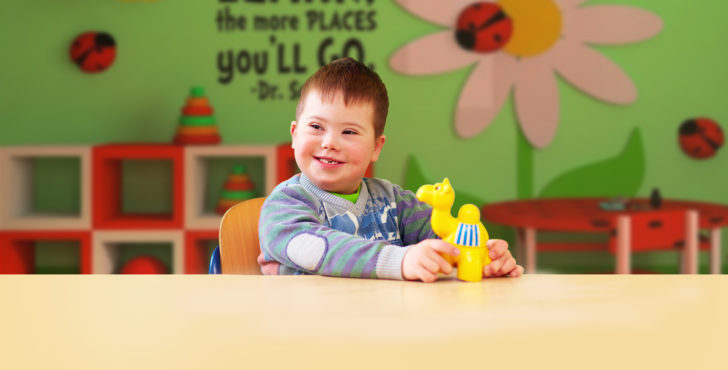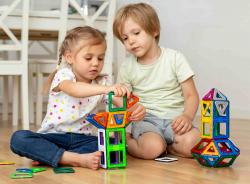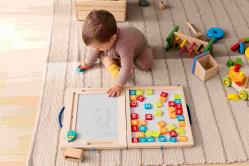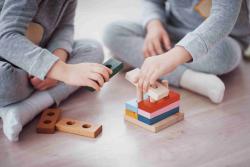Play has a powerful role in supporting the development and learning of special needs children. Play is not just a source of entertainment, but it is also an important tool for enhancing physical, cognitive, emotional, and social skills. In this guide, we provide parents with a comprehensive overview of the types of toys that can help support their child's development and learning.
Understanding Special Needs Children and Their Unique Needs
Special needs children refer to those who require additional support to cope with challenges that arise from physical, cognitive, or emotional disabilities. These children may have different types of special needs, including physical disabilities, developmental delays, sensory processing issues, or learning disabilities. Understanding your child's unique needs is essential to choose toys that can help support their development.
Factors to Consider When Choosing Toys for Special Needs Children
When it comes to choosing toys for special needs children, there are several factors to consider to ensure that the toys are appropriate and beneficial for their development. Here are some of the key factors to keep in mind:
- Safety and Durability: Safety should always be the top priority when selecting toys for special needs children. Look for toys that are made from safe and non-toxic materials, and avoid toys with small or detachable parts that could pose a choking hazard. Durability is also important, as special needs children may require toys that can withstand more wear and tear than typical toys.
- Age Appropriateness: It's essential to choose toys that are age-appropriate for your child. Toys that are too simple or too complex can be frustrating and may not provide the necessary stimulation for their development.
- Skill Level: Consider your child's skill level when choosing toys. If your child is working on developing specific skills, such as fine motor skills or hand-eye coordination, look for toys that can help with those areas.
- Interests and Preferences: Like all children, special needs children have their own interests and preferences. Look for toys that align with your child's interests, as they are more likely to engage with and enjoy these types of toys.
- Sensory Features: Many special needs children have sensory processing issues and may require toys that provide sensory input or output. Look for toys with different textures, sounds, and colors that can help with sensory integration.
By considering these factors, you can choose toys that are safe, appropriate, and beneficial for your child's development.
Best Types of Toys for Different Special Needs
- Autism Spectrum Disorder: Children with Autism Spectrum Disorder often have difficulty with social interaction, communication, and imaginative play. Toys that promote interaction and communication, such as board games, storybooks, and puzzles can be helpful. Sensory toys, such as tactile balls, fidget spinners, and weighted blankets, can also be beneficial for calming and sensory regulation.
- Sensory Toys: Sensory processing issues can impact a child's ability to process and respond to sensory information. Sensory toys, such as squishy balls, sensory mats, and tactile toys, can be helpful in providing sensory input and regulating sensory responses.
- Toys for Stimming and Fidgeting: Children with special needs may have behaviors such as stimming or fidgeting that help them regulate their emotions and sensory input. Toys such as fidget spinners, stress balls, and chewable jewelry can help meet these needs in a safe and appropriate way.
- Social Skills Toys: For children with social communication difficulties, social skills toys such as puppets, play sets, and role-playing toys can be helpful. These toys can provide opportunities for children to practice social interaction and communication skills in a safe and supportive environment.
- Pretend Play Toys: Pretend play is an essential part of child development and can help improve cognitive and social skills. Pretend play toys, such as play kitchens, dress-up clothes, and dolls, can help promote imaginative play and encourage children to explore different roles and scenarios.
- Visual and Spatial Toys: Children with visual and spatial difficulties can benefit from toys that help improve their visual and spatial awareness. Toys such as building blocks, puzzles, and matching games can help improve these skills.
Attention Deficit Hyperactivity Disorder (ADHD):
Children with ADHD can benefit from toys that help them release their energy and improve their focus and attention skills. Some recommended toys for children with ADHD include:
- Toys for Physical Activity: Outdoor toys like bikes, scooters, and trampolines are great for children with ADHD to help them release their energy and get some exercise.
- Executive Functioning Toys: Toys like puzzles, board games, and memory games help children with ADHD improve their executive functioning skills, such as planning, organization, and problem-solving.
- Focus and Attention Toys: Toys that require focus and concentration, such as building blocks, art materials, and musical instruments, help children with ADHD improve their attention and focus skills.
- Sensory Integration Toys: Toys that stimulate the senses, like playdough, kinetic sand, and stress balls, help children with ADHD regulate their emotions and stay calm.
Down Syndrome:
Children with Down Syndrome have unique developmental needs and can benefit from toys that support their motor, language, and cognitive skills. Some recommended toys for children with Down Syndrome include:
- Fine Motor Skills Toys: Toys like puzzles, pegboards, and stacking toys help children with Down Syndrome improve their fine motor skills and hand-eye coordination.
- Communication and Language Development Toys: Toys that promote communication and language development, such as books, interactive toys, and communication devices, help children with Down Syndrome improve their language and communication skills.
- Gross Motor Skills Toys: Toys like balls, balance beams, and bean bag toss games help children with Down Syndrome improve their gross motor skills and coordination.
- Visual Perception Toys: Toys that promote visual perception and discrimination, such as matching games, sorting toys, and shape sorters, help children with Down Syndrome improve their visual perception and recognition skills.
Cerebral Palsy:
Children with Cerebral Palsy have unique mobility and communication needs and can benefit from toys that support their motor, communication, and sensory skills. Some recommended toys for children with Cerebral Palsy include:
- Mobility Aids: Adaptive toys like walkers, canes, and wheelchairs can help children with Cerebral Palsy improve their mobility and independence.
- Fine Motor Skills Toys: Toys like squishy balls, lacing toys, and building blocks help children with Cerebral Palsy improve their fine motor skills and hand-eye coordination.
- Communication Devices: Toys that promote communication and language development, such as electronic communication devices and voice output switches, help children with Cerebral Palsy improve their communication skills.
- Sensory Toys: Toys that provide sensory stimulation, such as weighted blankets, sensory swings, and tactile toys, help children with Cerebral Palsy improve their sensory integration skills.
Adaptations and Modifications for Toys:
Sometimes, children with special needs may require adaptations or modifications to toys to make them accessible and enjoyable. Some examples of adaptations and modifications include:
- Simple Modifications for Children with Motor Limitations: Adapting toys to be easier to grasp, hold, or manipulate can help children with motor limitations play independently. For example, adding loops or handles to toys, using Velcro instead of buttons, or using larger pieces for puzzles.
- Alternative Ways to Play with Toys for Children with Cognitive or Sensory Challenges: Finding alternative ways to play with toys can help children with cognitive or sensory challenges enjoy them. For example, playing with toys in different positions, using toys in combination with other sensory tools, or providing visual or auditory cues to support play.
- Adapting Toys to Meet Individual Needs: Customizing toys to meet individual needs can help children with special needs access and enjoy them. For example, adding switches to toys for children with limited hand function, adapting toys to be activated by eye gaze or head movement, or adjusting the speed or intensity of toys.
Best Practices for Playing with Special Needs Children:
- Creating a Safe and Supportive Environment: It is important to create a safe and supportive environment for special needs children to play. This includes ensuring that the play area is free from potential hazards, providing appropriate supervision, and allowing for breaks if needed.
- Encouraging Engagement and Participation: Encourage special needs children to engage in play by choosing toys that are engaging and interesting to them. Try to use toys that are appropriate for their developmental level, and provide a variety of toys to keep their interest.
- Promoting Communication and Socialization: Toys that encourage communication and socialization can be helpful for special needs children. This can include toys that encourage turn-taking, sharing, and conversation. Try to create opportunities for communication and socialization during playtime.
- Fostering Independence and Self-Confidence: Encourage special needs children to play independently, and give them opportunities to make choices and decisions during playtime. This can help foster independence and self-confidence.
Resources for Finding Toys for Special Needs Children:
- Online Resources for Toy Ideas: There are many online resources available for finding toys for special needs children. At Toys"R"Us, we offer a wide variety of toys that can be sorted by age, skill level, and special needs category.
- Support Groups and Communities in India: Support groups and communities can be a great resource for finding toys for special needs children. These groups often share information about helpful toys and resources, and can provide support and advice to parents and caregivers. Non-profit organizations such as Association for People With Disabilities and ASTHA have stepped up to provide care for children with disabilities.
Toy Safety and Best Practices:
- General Toy Safety Tips: It is important to choose toys that are appropriate for the child's age and developmental level, and to always supervise children during playtime. Be sure to check for any potential hazards such as sharp edges or small parts that could be swallowed.
- Specific Safety Considerations for Special Needs Children: Special needs children may have specific safety considerations, such as the need for extra supervision during playtime or the use of sensory-safe toys. Be sure to consult with a healthcare professional or therapist for specific safety recommendations.
- Guidelines for Cleaning and Maintaining Toys: Regularly cleaning and maintaining toys can help ensure their safety and longevity. Follow the manufacturer's instructions for cleaning and storing toys, and be sure to regularly inspect toys for any signs of wear or damage.
Benefits of Playing with Toys for Special Needs Children:
- Social and Emotional Benefits: Playing with toys can help special needs children develop social and emotional skills, such as communication, turn-taking, and empathy.
- Physical Benefits: Playing with toys can also provide physical benefits, such as developing fine and gross motor skills, improving coordination, and increasing physical activity levels.
- Cognitive Benefits: Toys can also help special needs children develop cognitive skills, such as problem-solving, creativity, and critical thinking.
- Language and Communication Benefits: Certain toys can be particularly helpful for developing language and communication skills, such as books, puzzles, and games.
Challenges and Obstacles in Accessing Toys for Special Needs Children:
- Financial Barriers: Special needs toys can be expensive, and not all families may have the financial resources to purchase them.
- Limited Availability: Some special needs toys may not be readily available in all areas, particularly in rural or remote areas.
- Stigma and Misconceptions: There may be stigma and misconceptions surrounding special needs children and their play needs, which can make it difficult for families to access appropriate toys.
- Lack of Knowledge and Resources: Some families may not be aware of the benefits of play for special needs children, or may not have access to information about appropriate toys and resources.
Conclusion:
Empowering special needs children through play is an important way to support their development and learning. By choosing appropriate toys, creating a safe and supportive play environment, and encouraging engagement and participation, parents and caregivers can help their children develop important skills and foster independence.
FAQs:
- What are the best types of toys for children with autism?
When choosing toys for children with autism, it's important to consider their sensory preferences. Sensory toys, such as weighted blankets, fidget toys, and tactile balls, are often recommended. Toys that encourage social interaction, such as board games and pretend play toys, can also be beneficial. Visual and spatial toys, such as puzzles and building blocks, can help with cognitive development.
- How can I adapt toys for my child with cerebral palsy?
Adapting toys for children with cerebral palsy can involve simple modifications, such as adding handles or Velcro straps to make them easier to grip. Alternative ways to play with toys, such as using a head pointer or switch, can also be helpful. Some toys, such as communication devices, can be specifically designed for children with cerebral palsy.
- Are there any safety concerns I should be aware of when buying toys for my special needs child?
General toy safety tips apply to all children, but for special needs children, it's important to also consider any specific safety concerns. For example, children with sensory processing issues may be sensitive to loud noises, flashing lights, or certain textures. It's important to always read the toy's label and instructions and monitor your child while they play.
- Where can I find resources for special needs toys?
Online resources, such as Toys"R"Us, offer a wide selection of toys specifically designed for special needs children. Support groups and communities can also be a valuable resource for finding toy ideas and recommendations. Additionally, occupational therapists and other healthcare professionals can provide guidance on choosing appropriate toys for your child's unique needs.
 Free Delivery On Orders Over ₹ 999
Free Delivery On Orders Over ₹ 999 Order By 6Pm For Next Day Delivery!
Order By 6Pm For Next Day Delivery!








The information below is required for social login
Sign In
Login
Login With OTP
Login With Email
Verify your phone number
OTP has been sent to
Resend OTP
Or
By continuing, you agree to ToysRus’s Conditions of Use and Privacy Notice.
Create New Account